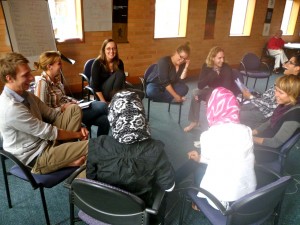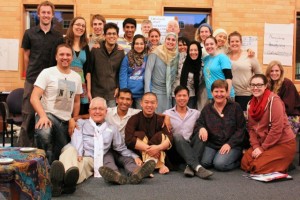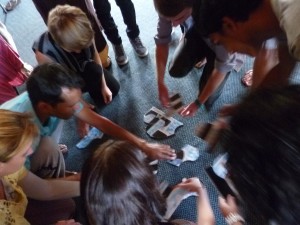Course content will be shaped around a unique and integrated combination of both ‘inner’ and ‘outer’ topics including nonviolent leadership; spiritual formation; interfaith dialogue; identity, culture and belonging; self care and participation in society. The program will provide skills for putting into practice the insights of living nonviolently.
Unit 1: Gathering and Grounding in a Culture of Co-Learning – Sharing Stories
Participants will be given the opportunity to:
- Share personal stories – What brings you to this place?
- Share stories of connection within faith traditions – What sustains you in your faith?
- Reflect on the experience of community
- Begin to engage the experience of the community within
Unit 2: Dominant Culture: Social and Personal Impacts
Participants will interactively explore:
- The formation and maintenance of groups and subcultures within society

- How the cycles of violence are legitimised, validated and perpetuated
- The pervasive nature of dominant culture for the individual
- Characteristics of spiritualties that perpetuate violence
- Key characteristics of nonviolent spiritualties
Unit 3: Nonviolence in my Faith Tradition
Participants will be encouraged to:
- Explore the connection between culture and faith
- Engage in critical self-reflection on the interface of culture and faith
- Think about strategic nonviolent alternatives for living

- Reflect on their faith traditions and
- Self-understanding
- An understanding of Others as neighbours
- Experiences of Transformation
- Consider project development: How will I address extreme ideologies of violence?
Unit 4: Practical Skills for Nonviolent Living
Participants will learn about and explore:
- 5 skill sets for personal, interpersonal and social engagem
 ent in nonviolent communication
ent in nonviolent communication - Individual principles which support nonviolent living and communication
- Spiritual practices to sustain nonviolent living and communication
Unit 5: Next steps for Personal and Project Development
Participants will be invited to:
- Engage with a nonviolent self-organising process (Open Space Technology)
- Begin to create projects designed to increase the capacity of their local communities to provide alternatives to violence
- Begin to organise networks of support and ongoing learning with each other in preparation for the design of Module 2

You must be logged in to post a comment.